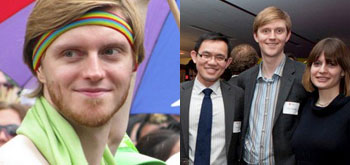There is a lot of conversation and concern in Toronto’s Queer community surrounding the news that Pride Toronto is drafting a “freedom of expression policy” that will govern what signs will be allowed in this year’s parade. Pride’s Executive Director Tracey Sandilands has said only language that incites “violence or hatred” will be disallowed, but concerns remain that those words are not defined and could be broadly interpreted. It’s hard to not see this unprecedented development as a direct response to last year’s parade participation of a group called Queers Against Israeli Apartheid (QuAIA) which caused controversy.
The situation is a challenge for those like myself who would represent the Church/Wellesley Village at city hall. While the conflict in the Middle East is obviously not and should not be a civic issue, nor is the definition or prohibition of hate speech, the councillor of Ward 27 must be a clear and unapologetic advocate for the LGBT community. They must also represent those members of our community who find some of the language that was used by participants in last year’s Pride highly objectionable. How does one person walk that line?

I think we begin by working to find common ground. Something straight people like myself need to understand about the Queer community in general—and the history of Pride in specific—is that censorship, perceived or real, is anathema. The Pride celebrations we know today owe their very existence to the rejection of pressures that would try to control, silence or sideline unpopular or disruptive voices. Many in the queer community I’ve talked to in the past few days view any attempt to filter or sanitize the Pride parade in anyway not only as a huge step backwards, but a dangerous one that summons memories of the days not long ago where so many people were not able to openly acknowledge their own sexual or gender identity. (Not that that stigma has been completely defeated, but we’ve come a long way and we don’t want to go back.)
Similarly, something non-Jewish people—again, like myself—need to understand about the Jewish community is that they have an extremely high sensitivity towards any language that even flirts with the thin edge of the slippery slope towards anti-Jewish or anti-Israel (in the “Israel should not exist” sense) sentiment, and for good reason. Like with the Queer community, this sensitivity comes from a memory of a time not so long ago when mere words helped to set off one of the most horrific series of actions in the history of humankind. Today, we hopefully don’t need to be reminded, antisemitism is still a present and persistent threat that must be vigilantly identified and condemned.
There, simultaneously, is the source of tension and also the opportunity for common ground. Members of these two groups find themselves in conflict over where to draw the line when it comes to freedom of expression. Not only that, but their definitions of what kind of uncomfortable speech should be tolerated are, in some ways, at the core of their communal histories. And yet, they are united by an oppressive past and an understanding of prejudice and hatred that all too often persists. They share a desire to fight ignorance, to defend their rights and to proudly celebrate their identities.
The question therefore becomes, what is the best way to accomplish those shared objectives? In the struggle between defending freedom of expression and preventing groups from being targeted, what wins out?
In this specific case, sunlight is the best disinfectant. Instead of allowing intolerance to breed in dark corners, let’s bring it out in the open so we can name it and repudiate it in public. Or, as Xtra’s Marcus McCann put it, Pride Toronto should go so far as to “[endorse] free expression for those who are anti-gay; it is better that they are laughed out of the commons than their opinions be allowed to fester in private.”
Using the words “apartheid state” to describe Israel, as one group did in last year’s Pride parade, is hurtful, dangerous, and displays a titanic misunderstanding of the complexity of the situation. But it’s not the job of Pride organizers to serve as arbiters of what amounts to allowable protest. If it comes down to it we already have laws against inciting violence or hatred. Keep Pride free, as it should be, and let individuals be judged for how they choose to use that freedom.